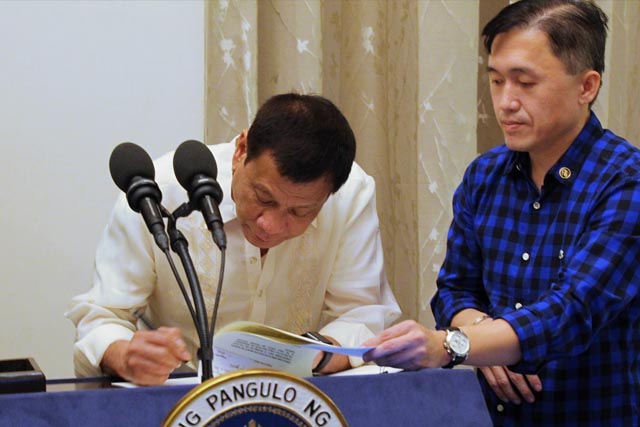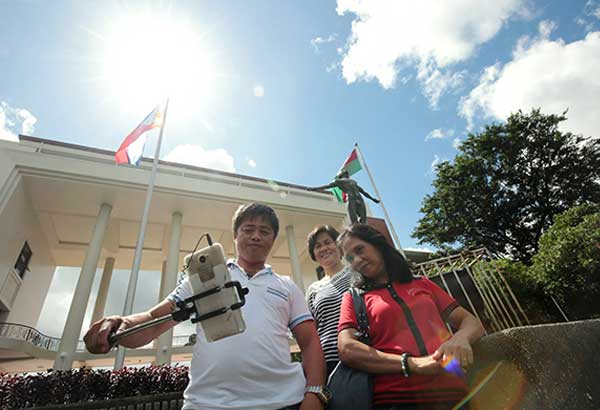Duterte signs law on free college tuition

Free education in state colleges and universities edged closer to reality after President Rodrigo Duterte signed into law the Universal Access to Quality Tertiary Education Act. File
Congress assures funding for 2018 implementation
MANILA, Philippines - Free education in state colleges and universities edged closer to reality after President Duterte signed into law the Universal Access to Quality Tertiary Education Act.
Duterte signed Republic Act 10931 on Thursday night or hours before it would have lapsed into law today, despite concerns raised by his economic team about funding for the program.
The President asked Congress to make the necessary appropriations for the law, which guarantees free tuition and other miscellaneous fees for students in 112 state universities and colleges (SUCs) across the country.
Budget Secretary Benjamin Diokno stressed the law would take effect next school year.
Citing figures posted by the Commission on Higher Education (CHED), senior deputy executive secretary Menardo Guevarra said the initial P16 billion allotted for the program would be “manageable” to cover tuition and miscellaneous fees.
“I don’t know if there is budget allocated for 2017. But hopefully, this will be in place in the next enrollment period,” Guevarra said.
Speaking at the Mindanao Hour held jointly with the Bangon Marawi forum yesterday, Guevarra said the free tuition law was part of the President’s social development agenda.
“Under the law, Congress is supposed to make the necessary appropriations to fund the free SUC education project,” Guevarra said.
He said the President signed the measure amid concerns raised by his economic team that it would have serious effects on the government’s budget.
“But free tuition in tertiary education in SUCs is a pillar of the President’s social development policy,” Guevarra said.
“Before signing the measure, the President had to weigh the issues raised by his advisers and arrived at the conclusion that the long-term benefits of the free tuition will outweigh the short-term budgetary challenges,” he added.
Approved by Congress in May, the bill was transmitted to the Office of the President on July 5 for Duterte’s signature.
The measure aims to provide subsidies to students in SUCs, local tertiary schools, as well as institutions accredited with the Technical Education and Skills Development Authority.
Diokno earlier said the government would need at least P100 billion annually to cover the free tuition for SUCs.
Next school year
In a text message to The STAR, Diokno said the law will take effect next school year. “The law will be prospective, not retroactive, since academic year 2017 to 2018 is already ongoing,” Diokno said.
“Hence, in the immediate term, we’re talking of academic year 2018 to 2019, strictly speaking, the first semester,” he added.
He also stressed the government has yet to come up with an estimate on how much the program would cost.

Parents take a selfie in front of the UP Oblation in Diliman, Quezon City yesterday. MICHAEL VARCAS
“The estimate has to be preceded by the number of predetermined students who are chosen, say X, on the basis of a nationwide test administered by CHED. Unless we know X, we can’t give an estimate,” he said.
Asked where the budget for the free tuition bill would come from, Diokno said the DBM would have to estimate the cost first and assess if there is enough space in the 2018 budget for the program.
“First, I’ll estimate the half year total costs of program, first semester 2018 to 2019, then determine how much can be funded from the 2018 budget. If worse comes to worst, we may consider asking for supplemental budget,” the budget chief said.
He said there may also be changes in the provisions of the 2018 national budget.
“There will be changes in the President’s 2018 budget which has some P16 billion in various types of scholarship,” he said.
As head of the Development Budget Coordination Committee (DBCC), Diokno said he will lead the group that will prepare the implementing rules and regulations of the new law.
Earlier, the country’s economic managers voiced opposition to the enactment of the law, citing the large amount of funds required for the measure.
Initial estimates of the DBM put the required budget for the program at P100 billion.
“The budget for free tuition is really quite large. It’s not pittance. It’s going to be unsustainable over time,” Socioeconomic Planning Secretary Ernesto Pernia had said.
Congress’ assurance
Amid funding worries, the House of Representatives assured college students yesterday that it would allot the necessary funds for the law on free education in SUCs.
Davao City Rep. Karlo Nograles, appropriations committee chairman, said his panel would “tweak and adjust the proposed P3.767-trillion national budget for 2018 so that the free college education program will be fully implemented.”
“Education is a great equalizer. It gives the poor an opportunity to change his way of life. We have reviewed the possible financial implications of this proposal and I can say that there is enough money to jumpstart this and sustain it in the long term,” he said.
Nograles said Congress had allocated P8 billion for free education in SUCs this year.
He said among the sources of funds for free education in SUCs are the allocations for underperforming agencies, as well as unused and unnecessary appropriations like those for travel and training and seminars.
Rep. Salvador Belaro Jr. of Ang Edukasyon party-list proposed the issuance of bonds to fund the free college education.
“For the next five years of the Duterte administration until 2022, we will need at least P500 billion, assuming that calculations of the Department of Budget and Management are correct,” he said.
Former president and Pampanga Rep. Gloria Macapagal-Arroyo, one of the authors of the free education law, said the law “is laudable because it does not only address the needs of students in public colleges and universities, but also the needs of underprivileged students who would fail to make the cut in SUCs.”
During her nine-year term, Arroyo launched a student loan project that extended interest-free loans to poor college students.
“The President’s signing into law of the free SUCs tuition bill will go a long way in helping the government achieve economic inclusion for all, given that education is the great social equalizer,” Camarines Sur Rep. Luis Raymund Villafuerte said.
“Giving youths access to college education will enable them to eventually get quality and better-paying jobs, which, in turn will spell better living standards for them. Hence, this measure is crucial to the President’s agenda for high and inclusive growth,” he said.
Eastern Samar Rep. Ben Evardone said the law is one of the best anti-poverty measures taken by the Duterte administration.
“It will help a lot of poor students in state-owned tertiary schools realize their dream of a better life for them and their families,” he said.
Militant groups also lauded the enactment of the law.
“There should be adequate appropriations in the General Appropriations Act,” Bagong Alyansang Makabayan (Bayan) said in a statement.
“For so long, public college education suffered from lack of government subsidy and excessive school fees,” it said.
“The new measure should correct this by providing adequate funding and by scrapping the unjust income-generating schemes imposed on students and parents,” Bayan added.
Pivotal moment
Senate President Aquilino Pimentel III said Duterte’s enactment of the law was “a pivotal moment in the war against poverty.”
“I have always believed that education is the great equalizer. I am where I am today because of my education,” Pimentel said in a statement.
“A college diploma is the most decisive tool a Filipino can carry in the struggle to give his or her family a better life, and President Duterte has just given every Filipino the means to have it,” he said.
Sen. Francis Escudero, chairman of the Senate committee on education and sponsor of the law in the chamber, said the law “will be one of the lasting legacies” of Duterte and “will go a long way for the Filipino youth.”
“I am very grateful that he signed it over and above the concerns and reservations of his economic managers,” Escudero said.
Senate President Pro-Tempore Ralph Recto expressed belief that Duterte’s economic advisers inflated the amount needed to implement the measure to discourage the Chief Executive from signing it.
Recto, one of the co-authors of the law, said the cost of free tuition was nowhere near P100 billion.
“By signing the law, he is in effect lecturing the nation that we should not just build, build, build for the sake of our future, but also teach, teach, teach our youth,” Recto said.
Sen. Joseph Victor Ejercito, one of the principal authors of the bill, also thanked Duterte.
“This is an investment to further equip our most precious resource – the human resource,” Ejercito said.
Sen. Joel Villanueva said the law would greatly help develop the country’s human capital.
“Our people are our greatest asset, that’s why the biggest investment of the government should go to them,” Villanueva said.
Sen. Juan Miguel Zubiri said college education is not only a “way out of poverty” but also “the country’s passport to become a true tiger economy” with a well-educated citizenry.
Recto said the “hard work” awaiting Congress is appropriating funds to ensure smooth implementation of the law.
“The challenge now is how to fund the measure, effective next year, because budget delayed is education denied,” he said.
Escudero explained the law did not specify the amount in the appropriation clause “in order to give the Department of Budget and Management enough leeway in programming the implementation.”
He pointed out the amount needed to fund the free tuition, miscellaneous and other fees of students in SUCs alone would only cost P20 billion, a mere 0.5 percent of the total proposed national budget for next year.
He said the full implementation of the law would only require around P43 billion, or a little over one percent of the proposed national budget.
Victory for students
Anakbayan described the signing of the free college education law as a “victory for the present and future generations of Filipino students.”
Anakbayan chairman Vencer Crisostomo lauded the President’s decision to go against the recommendation of his economic managers to veto the bill.
Kabataan party-list Rep. Sarah Elago and Presidential Commission for the Urban Poor chairman and former congressman Terry Ridon also praised Duterte for the enactment of the law.
“The Duterte administration sends a message to poor households that low income should not be a burden for our children to dream of a better life,” Ridon said.
Social Welfare Secretary Judy Taguiwalo also joined the chorus of praise for President Duterte’s signing the law on free tuition.
“We are grateful to the President for heeding the appeals of students and their parents on the matter. This is a very positive step forward in our collective efforts as a people to democratize access to education and help ease the financial burdens of so many Filipinos who want to improve the quality of their lives and their chances at a better future by gaining college degrees,” Taguiwalo said.
The Associated Labor Union (ALU) also praised Duterte for “doing the right thing.”
“This is very good news to poor college and vocational students who were forced to stop studying because of inadequate daily wage of their working parents and rising cost of living. Poor students now have the opportunity to help lift the family out of poverty,” ALU-Trade Union Congress of the Philippines spokesman Alan Tanjusay said. – With Jess Diaz, Janvic Mateo, Mary Grace Padin, Paolo Romero, Marvin Sy, Ghio Ong, Rainier Allan Ronda, Sheila Crisostomo
- Latest
- Trending
































